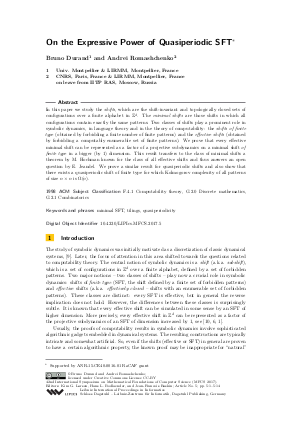On the Expressive Power of Quasiperiodic SFT
Authors Bruno Durand, Andrei Romashchenko
-
Part of:
Volume:
42nd International Symposium on Mathematical Foundations of Computer Science (MFCS 2017)
Part of: Series: Leibniz International Proceedings in Informatics (LIPIcs)
Part of: Conference: Mathematical Foundations of Computer Science (MFCS) - License:
 Creative Commons Attribution 3.0 Unported license
Creative Commons Attribution 3.0 Unported license
- Publication Date: 2017-12-01
File

PDF
LIPIcs.MFCS.2017.5.pdf
- Filesize: 481 kB
- 14 pages
Document Identifiers
Subject Classification
Keywords
- minimal SFT
- tilings
- quasiperiodicityIn this paper we study the shifts
- which are the shift-invariant and topologically closed sets of configurations
Metrics
- Access Statistics
-
Total Accesses (updated on a weekly basis)
0Document
0Metadata
Abstract
In this paper we study the shifts, which are the shift-invariant and topologically closed sets of configurations over a finite alphabet in Z^d. The minimal shifts are those shifts in which all configurations contain exactly the same patterns. Two classes of shifts play a prominent role in symbolic dynamics, in language theory and in the theory of computability: the shifts of finite type (obtained by forbidding a finite number of finite patterns) and the effective shifts (obtained by forbidding a computably enumerable set of finite patterns). We prove that every effective minimal shift can be represented as a factor of a projective subdynamics on a minimal shift of finite type in a bigger (by 1) dimension. This result transfers to the class of minimal shifts a theorem by M.Hochman known for the class of all effective shifts and thus answers an open question by E. Jeandel. We prove a similar result for quasiperiodic shifts and also show that there exists a quasiperiodic shift of finite type for which Kolmogorov complexity of all patterns of size n\times n is \Omega(n).
Cite As Get BibTex
Bruno Durand and Andrei Romashchenko. On the Expressive Power of Quasiperiodic SFT. In 42nd International Symposium on Mathematical Foundations of Computer Science (MFCS 2017). Leibniz International Proceedings in Informatics (LIPIcs), Volume 83, pp. 5:1-5:14, Schloss Dagstuhl – Leibniz-Zentrum für Informatik (2017)
https://doi.org/10.4230/LIPIcs.MFCS.2017.5
BibTex
@InProceedings{durand_et_al:LIPIcs.MFCS.2017.5,
author = {Durand, Bruno and Romashchenko, Andrei},
title = {{On the Expressive Power of Quasiperiodic SFT}},
booktitle = {42nd International Symposium on Mathematical Foundations of Computer Science (MFCS 2017)},
pages = {5:1--5:14},
series = {Leibniz International Proceedings in Informatics (LIPIcs)},
ISBN = {978-3-95977-046-0},
ISSN = {1868-8969},
year = {2017},
volume = {83},
editor = {Larsen, Kim G. and Bodlaender, Hans L. and Raskin, Jean-Francois},
publisher = {Schloss Dagstuhl -- Leibniz-Zentrum f{\"u}r Informatik},
address = {Dagstuhl, Germany},
URL = {https://drops.dagstuhl.de/entities/document/10.4230/LIPIcs.MFCS.2017.5},
URN = {urn:nbn:de:0030-drops-80985},
doi = {10.4230/LIPIcs.MFCS.2017.5},
annote = {Keywords: minimal SFT, tilings, quasiperiodicityIn this paper we study the shifts, which are the shift-invariant and topologically closed sets of configurations}
}
Author Details
References
-
Nathalie Aubrun and Mathieu Sablik. Simulation of effective subshifts by two-dimensional subshifts of finite type. Acta Applicandae Mathematicae, 128(1):35-63, 2013.

-
Sergey V. Avgustinovich, Dmitrii G. Fon-Der-Flaass, and Anna E. Frid. Arithmetical complexity of infinite words. In 3rd Int. Colloq. on Words, Languages and Combinatorics, pages 51-62, 2003.

-
Alexis Ballier and Emmanuel Jeandel. Computing (or not) quasiperiodicity functions of tilings. In 2nd Symposium on Cellular Automata Journées Automates Cellulaires (JAC 2010), pages 54-64, 2010.

-
Bruno Durand. Tilings and quasiperiodicity. Theoretical Computer Science, 221(1):61-75, 1999.

-
Bruno Durand, Leonid Levin, and Alexander Shen. Complex tilings. The Journal of Symbolic Logic, 73(2):593-613, 2008.

-
Bruno Durand, Andrei Romashchenko, and Alexander Shen. Fixed-point tile sets and their applications. Journal of Computer and System Sciences, 78(3):731-764, 2012.

-
Brunourand Durand and Andrei Romashchenko. Quasiperiodicity and non-computability in tilings. In Proc. International Symposium on Mathematical Foundations of Computer Science (MFCS 2015), pages 218-230, 2015.

-
Peter Gács. Reliable computation with cellular automata. Journal of Computer and System Sciences, 32(1):15-78, 1986.

-
Gustav Hedlund and Marston Morse. Symbolic dynamics. American Journal of Mathematics, 60(4):815-866, 1938.

-
Michael Hochman. On the dynamics and recursive properties of multidimensional symbolic systems. Inventiones mathematicae, 176(1):131-167, 2009.

-
Michael Hochman and Pascal Vanier. A note on turing degree spectra of minimal shifts. In The 12th International Computer Science Symposium in Russia, pages 154-161, 2017.

-
Emmanuel Jeandel. Personal communication. private communication, 2015.

-
Emmanuel Jeandel and Pascal Vanier. Turing degrees of multidimensional sfts. Theoretical Computer Science, 505:81-92, 2013.

-
Andrey Rumyantsev and Maxim Ushakov. Forbidden substrings, kolmogorov complexity and almost periodic sequences. In Annual Symposium on Theoretical Aspects of Computer Science, pages 396-407, 2006.

-
Pavel V. Salimov. On uniform recurrence of a direct product. Discrete Mathematics and Theoretical Computer Science, 12(4), 2010.

-
Linda Brown Westrick. Seas of squares with sizes from a Π⁰₁ set. arXiv preprint arXiv:1609.07411, 2016.

